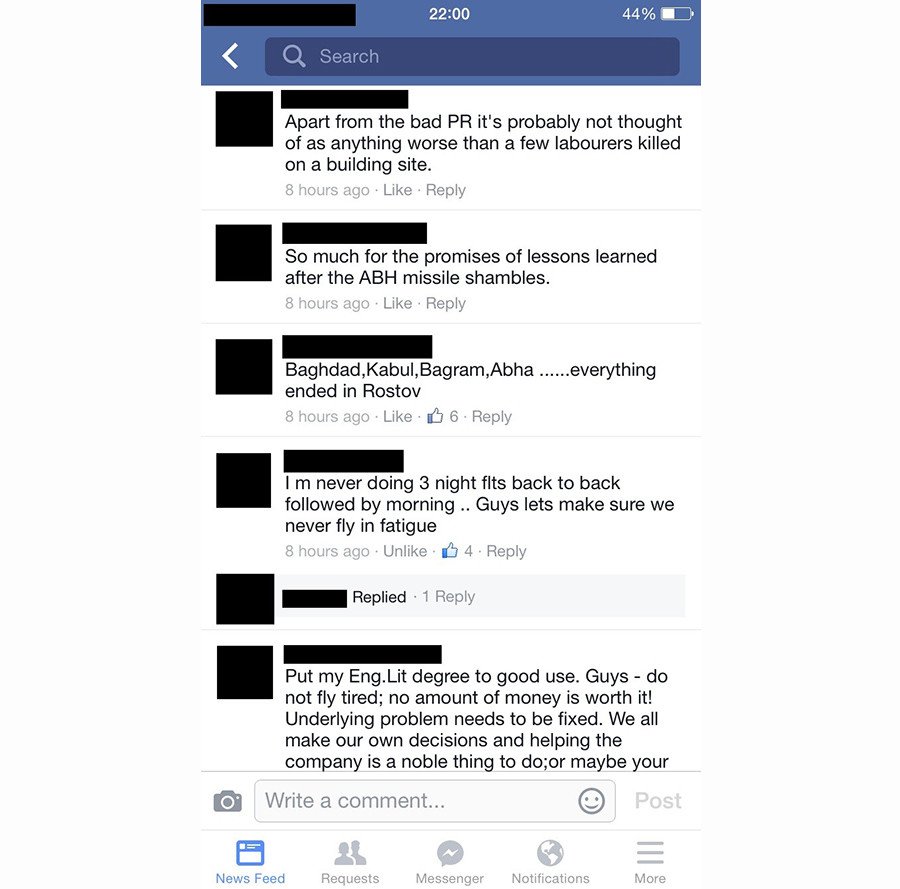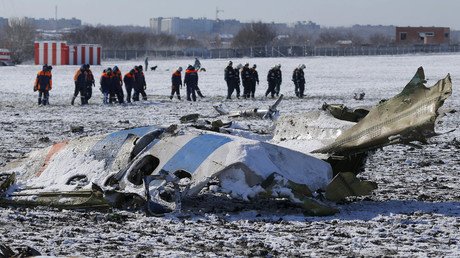Flydubai FZ981 co-pilot was fatigued, but 'tremendous pressure' made him work – colleague to RT
Flydubai has long pushed the boundaries of sensible operating policy, a pilot purporting to work for the airline told RT. He says it encourages not reporting illness or fatigue, as was allegedly also the case with the crashed flight’s Alejandro Alava.
After the crash of low-cost carrier Flydubai’s flight FZ981 in Rostov-on-Don last week, a former pilot blew the whistle in an interview with RT on how the company allegedly pushes its employees to work hectic and long rosters, ignoring complaints that this puts lives in danger. That report has now been corroborated by a person who claims to be a current Flydubai pilot.
“If anything, since [the original whistleblower to RT] left, things got worse,” the pilot, who asked not to be named because he fears reprisals from his current employer, told RT. “The pressure applied to pilots by the management is tremendous.”
‘I’ll fly because we need the money’
The pilot, who says he has been with the company for years, said the payment scheme that Flydubai uses puts pressure on crew members not to call in sick. A pilot who chooses not to fly because of sickness or fatigue, which is a sensible thing to do, would lose a lot of money and may get into a really tight spot in Dubai, where the cost of living is very high, he explained.
“People fly when they are unfit because of sickness, sadly. And they also fly with the fatigue,” he said. “Everyone has a family, everyone has children and wife and mortgages they have to pay. So financial pressure is personal pressure.”
This pressure was allegedly in place when FZ981 First Officer Alejandro Alava decided that he would be on the ill-fated flight.
“I know for a fact from a close friend of [Alava’s] wife that he didn’t want to go to work because he was tired. But he said ‘I have to go to work because we are having twins, we are going to need the money,’” the pilot said.
Pilot fatigue may be a contributing factor in a serious incident. This is especially true for flights to destinations, where ground services are not up to high standards in place in North America or Europe, the claimed pilot noticed, adding that Flydubai flies to such destinations.
“Flydubai flies to war zones, to Afghanistan. We fly to parts of Africa that have semi-controlled environments… This adds an additional risk. And when you have a tired pilot who is meant to make quick and accurate decisions, you are asking for trouble. Flydubai has been pushing the boundaries of sensible operations for a long-long time,” he said.
‘Punitive culture’
The company not only turns a blind eye when a pilot gets into the cockpit in not-too-good shape, it actually encourages non-reporting of minor incidents caused by fatigue and puts pressure on those who do, the pilot claimed.

“They say there is no punitive culture and if you report nothing would happen, but many pilots had been leaned on quite firmly, and pilots that had spoken out had been fired because of it,” he said.
“They were not fired actually,” he corrected himself. “They were leaned on to resign and told that they would get end-of-service benefits if they resigned, or otherwise they would be fired. The company doesn’t like to fire people because they don’t want to have potential for a court case or for people to speak to the press.”
The pilot said people at the company used to joke that they would need to lose a plane for anything to change.
‘It all ended in Rostov’
The atmosphere of antagonism described to RT by Flydubai sources appears evident in social media, where alleged company employees talk between themselves out of the public eye. One of the comments on a private Facebook page published after the crash in Rostov-on-Don - a screenshot of which was sent by the same pilot to RT - grimly jokes about hiring “a Strippergramm dressed as a Russian policeman” for an upcoming meeting with a chief pilot.
“I am sure the 29th March is bring a journalist to work day!” another one says, referring to the upcoming meeting.

The commentators don’t seem to expect Flydubai to take measures to correct its policies after the fatal crash in Russia, which claimed 62 lives, including seven of their colleagues.
“Apart from the bad PR it’s probably not thought of as anything worse than a few laborers killed on a building site,” one comment said.
“Baghdad, Kabul, Baghram, Abha… everything ended in Rostov,” another one replies.
Flydubai is a low-cost airline owned by the United Arab Emirates. It was established in 2008 with Emirates Airlines helping it to take off. The two companies have no management ties other than being both owned by the UAE government.
When required to comment on the allegations, Flydubai denied any negligence and said it strictly followed all rules applying to duty time regulations in compiling duty rosters.
“For Flydubai the safety and welfare of our flight crew and cabin crew is of primary importance,” the airline told RT in an email. “If a member of flight crew feels that, for whatever reason, they have not been able to get enough rest before starting a shift, our Safety Management Systems (SMS), encourages pilots to declare themselves unfit to fly.”
The UAE aviation regulator, the General Civil Aviation Authority, said it is prohibited by the law from providing comments on the allegations.
The Interstate Aviation Committee, which is charged with investigation the FZ981 crash, said it would investigate RT’s report and comment after the probe.
RT encourages people who can shed light on the situation to write to flydubaigate@rttv.ru and tell us their stories.













